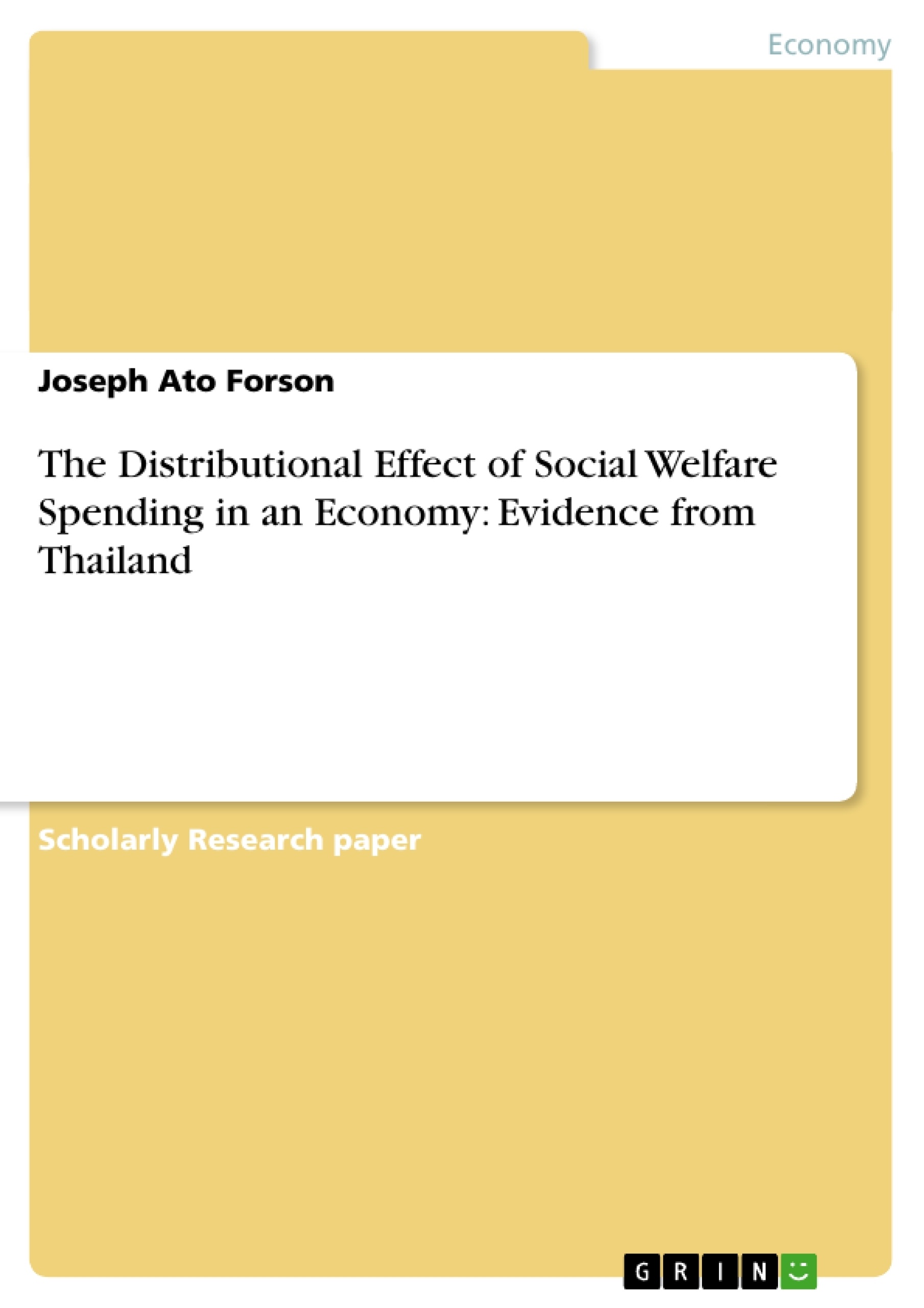This paper attempts to test the validity of public welfare spending theories (compensation theory, system theory, median voter theory, group theory, Incrementalism and some variants of public choice theory) in the context of Thailand. The study make use of GDP, previous welfare spending, increases in population, tax revenue, openness to trade, democratic government, labour union, trade association, urbanisation and welfare spending as a share of GDP over the period 1982 – 2007. We found strong and positive link between globalisation, GDP, tax revenue, labour union and previous welfare spending with Thailand welfare spending. These increases will invariably call for increased access to education, health care systems and other related welfare spending which means, the revenue base has to be increased through tax. We therefore recommend Thai Government to undertake reform in the tax system to broaden the tax net. Also, land and property tax systems ought to be reformed as well to extend coverage. We also recommend the stimulation of domestic demand in Thailand to reduce the over reliance on the international market which exposes countries to high end risks and uncertainties. The falling population growth in Thailand could also spell a doom to Thai’s labour supply. Thailand currently relies on immigrant workers from neigbouring countries like Myanmar, Laos, Vietnam and Burma. As the economic conditions in these countries improve, these immigrant workers might return. This will create a shortage in the supply needs to cater for the ever increasing demand propelled by the continuous industralisation of the Thai economy. Policy decision makers should factor this in their subsequent decision to mitigate this effect in the near future.
Inhaltsverzeichnis (Table of Contents)
- Introduction
- Research Questions
- Research Objectives
- Literature Review
- Conceptual Framework
- Hypothesis Testing
Zielsetzung und Themenschwerpunkte (Objectives and Key Themes)
This research aims to explore the factors driving the growth of government welfare spending in Thailand between 1982 and 2007. It seeks to assess the validity of existing welfare spending theories within the Thai context and provide recommendations to the Thai government based on empirical findings.
- The influence of economic factors like GDP, population growth, and urbanization on welfare spending.
- The role of globalization and trade openness in shaping government interventions and social programs.
- The impact of political factors, including democratic governance, interest group activities, and electoral cycles on welfare spending patterns.
- The relationship between income inequality and welfare spending, considering the potential impact of redistributive policies.
- The validity of various theories regarding the demand and supply sides of welfare spending.
Zusammenfassung der Kapitel (Chapter Summaries)
The introduction provides context for the study by examining the role of government in creating an enabling environment and addressing market inefficiencies. It highlights the importance of welfare spending in areas like education, health, and social transfers. The paper discusses conflicting findings on the effects of welfare spending on growth, citing studies that reveal both positive and negative impacts.
The research questions and objectives clearly outline the scope and goals of the research. They focus on identifying factors affecting welfare spending growth, determining the beneficiaries of social programs, and analyzing potential countermeasures to discourage reliance on welfare.
The literature review presents various theories that explain social welfare spending from both the demand and supply side perspectives. Key theories examined include Wagner's law, public choice theory, interest group theory, compensation theory, and incrementalism.
The conceptual framework outlines the relationship between independent and dependent variables, highlighting the key factors identified through the literature review. These variables are used to develop hypotheses for testing.
Schlüsselwörter (Keywords)
The primary focus of the research lies in examining the factors influencing welfare spending in Thailand, analyzing the effectiveness of different theories, and proposing recommendations for policy improvement. Key terms and concepts include welfare spending, Thailand, public welfare spending theories, GDP, population growth, urbanization, globalization, income inequality, democratic government, interest groups, and incrementalism.
Frequently Asked Questions
What drives government welfare spending in Thailand?
The study identifies GDP growth, tax revenue, globalization, labor unions, and previous spending levels as strong positive drivers for welfare expenditure in Thailand.
Which theories explain social welfare spending in this context?
The research tests theories such as Wagner's Law, public choice theory, interest group theory, compensation theory, and incrementalism.
What are the recommendations for the Thai tax system?
The authors recommend broadening the tax net and reforming land and property tax systems to increase the revenue base for social services.
How does globalization affect Thailand's social programs?
The study found a strong positive link between trade openness/globalization and increased welfare spending, supporting the compensation theory.
What is the "labor supply doom" mentioned in the abstract?
It refers to falling population growth in Thailand and the risk that immigrant workers from neighboring countries might return home as their own economies improve, creating a labor shortage.
- Citation du texte
- Joseph Ato Forson (Auteur), 2013, The Distributional Effect of Social Welfare Spending in an Economy: Evidence from Thailand, Munich, GRIN Verlag, https://www.grin.com/document/210953



